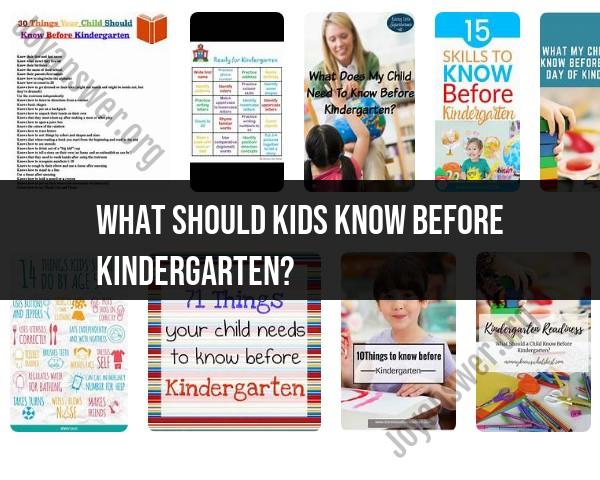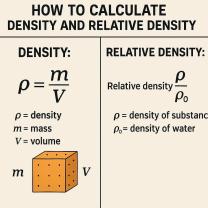What should kids know before kindergarten?
Before starting kindergarten, children typically benefit from developing a range of social, emotional, and cognitive skills that will help them succeed in a classroom setting. While there's no strict list of what every child should know, here are some general areas of development that are valuable for kids to have before entering kindergarten:
Social Skills:
- Sharing and taking turns.
- Playing well with others and being able to cooperate in group activities.
- Following simple classroom rules and routines.
- Expressing needs and wants in a respectful manner.
- Demonstrating empathy and understanding of others' feelings.
Emotional Skills:
- Identifying and expressing emotions, including being able to name common emotions like happy, sad, and angry.
- Managing emotions in a healthy way, such as calming down when upset.
- Developing a positive self-image and self-confidence.
Independence:
- Dressing and undressing independently, including managing buttons, zippers, and shoe fastenings.
- Using the restroom independently.
- Taking care of personal belongings like backpacks and lunchboxes.
Language and Communication:
- Developing a basic vocabulary and understanding of language.
- Being able to follow simple verbal instructions.
- Listening attentively during storytime or group discussions.
- Communicating needs and ideas clearly.
Fine Motor Skills:
- Holding a pencil or crayon correctly and being able to make basic shapes and letters.
- Using scissors to cut along lines or shapes.
- Engaging in activities that strengthen hand muscles, such as coloring or playing with playdough.
Cognitive Skills:
- Recognizing letters of the alphabet, both in uppercase and lowercase.
- Recognizing and counting numbers from 1 to 10.
- Identifying colors and basic shapes.
- Solving simple puzzles or engaging in age-appropriate problem-solving activities.
Basic Pre-Reading and Pre-Math Skills:
- Exposure to books and a love for reading.
- Recognizing that print runs from left to right and from top to bottom.
- Recognizing some sight words and understanding that words are made up of letters.
- Counting objects and understanding basic number concepts.
Curiosity and a Love of Learning:
- Showing an interest in exploring new things and asking questions.
- Being curious about the world and eager to learn.
Physical Skills:
- Being physically active and having good coordination and balance.
- Participating in activities like running, jumping, and climbing.
Attention and Focus:
- Being able to sit still for short periods and pay attention to tasks.
- Developing the ability to concentrate on a task or activity.
It's important to note that children develop at their own pace, and there is no one-size-fits-all checklist for kindergarten readiness. Kindergarten teachers are typically skilled at accommodating various levels of development within the classroom. Additionally, many kindergarten programs focus on developing these skills further during the school year. Parents and caregivers can help prepare children for kindergarten by providing a nurturing, stimulating environment, encouraging curiosity, and engaging in age-appropriate activities that promote these skills.
What are the essential skills and knowledge that children should possess before entering kindergarten?
Children should possess a variety of skills and knowledge before entering kindergarten. These include:
- Academic skills: Children should be able to recognize and write their name, identify letters and numbers, and count to 10. They should also have basic listening and comprehension skills.
- Social and emotional skills: Children should be able to follow directions, share and take turns, and resolve conflicts peacefully. They should also be able to express their emotions in a healthy way.
- Physical skills: Children should have the fine motor skills to hold a pencil and cut with scissors. They should also have the gross motor skills to run, jump, and climb.
How can parents and caregivers prepare children for a successful transition to kindergarten?
Parents and caregivers can prepare children for a successful transition to kindergarten by:
- Reading to them regularly: Reading to children helps them develop their vocabulary and comprehension skills. It also exposes them to different cultures and perspectives.
- Playing games and puzzles with them: Playing games and puzzles with children helps them develop their problem-solving and critical thinking skills. It also helps them learn how to follow directions and take turns.
- Talking to them about kindergarten: Parents and caregivers should talk to children about kindergarten and what to expect. They can also visit the kindergarten classroom with their child so that they can get a feel for the environment.
What are the social and emotional skills that are important for kindergarten readiness?
Social and emotional skills are just as important as academic skills for kindergarten readiness. Children who are socially and emotionally ready for kindergarten are more likely to succeed in school and in life.
Some important social and emotional skills for kindergarten readiness include:
- Self-regulation: The ability to control one's emotions and behavior.
- Cooperation: The ability to work with others towards a common goal.
- Problem-solving: The ability to identify and solve problems.
- Communication: The ability to communicate effectively with others.
- Resilience: The ability to bounce back from setbacks.
Is there a checklist or assessment to gauge a child's readiness for kindergarten?
There are a number of checklists and assessments that can be used to gauge a child's readiness for kindergarten. However, it is important to remember that these assessments are just one piece of the puzzle. Parents and caregivers should also consider their child's social and emotional development when making decisions about kindergarten readiness.
Some common checklists and assessments for kindergarten readiness include:
- The Ages and Stages Questionnaires (ASQ-3): A parent-completed questionnaire that assesses a child's development in five areas: communication, social-emotional, problem-solving, personal-social, and gross motor.
- The Kindergarten Readiness Assessment (KRA): A teacher-administered assessment that assesses a child's academic skills, such as letter and number recognition, and social-emotional skills, such as following directions and sharing.
What can educators do to support children who may not have had prior preschool experience?
Educators can support children who may not have had prior preschool experience by:
- Providing them with extra support in the classroom: Children who have not had preschool experience may need extra help with academic and social-emotional skills. Educators can provide this extra support through small group instruction, individualized instruction, and positive reinforcement.
- Partnering with parents and caregivers: Educators can partner with parents and caregivers to support children who may not have had prior preschool experience. Educators can provide parents and caregivers with resources and information about kindergarten readiness. They can also work with parents and caregivers to develop a plan to support the child's development.
By providing extra support and partnering with parents and caregivers, educators can help all children succeed in kindergarten, regardless of their prior preschool experience.












